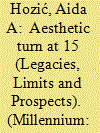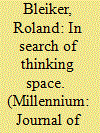| Srl | Item |
| 1 |
ID:
152107


|
|
|
|
|
| Summary/Abstract |
Roland Bleiker’s article ‘The Aesthetic Turn in International Political Theory’ appeared in this journal in December 2001 as part of a special issue on ‘Images, Narratives and Sounds’.1 The article drew a line between mimetic approaches to international relations, which did not ‘pay enough attention to the relationship between the represented and its representation’, and aesthetic approaches, which directly engaged ‘the gap that inevitably opens up between a form of representation and the object it seeks to represent’.2 Arguing that ‘representation is always an act of power
|
|
|
|
|
|
|
|
|
|
|
|
|
|
|
|
| 2 |
ID:
152114


|
|
|
|
|
| Summary/Abstract |
In the 15 years since the Millennium special issue on ‘Images, Narratives and Sounds’ scholarship on aesthetic politics has proliferated.1 Countless inquiries now show how aesthetics is about far more than art: it is about rethinking the fundamental issues that drive global politics. The moment has come to reflect on the contributions of the aesthetic turn and to identify potentials and challenges ahead. I do so by stressing that the key is not agenda-setting, but to continue the search for thinking space: to explore ever new ways of writing, seeing, hearing and sensing the political. I then identify two challenges: first, to push creative work while, at the same time, increasing the ability to speak to a broad audience; and second, to avoid the hubris of overarching explanations and, instead, cultivate pluralism and self-reflexivity. The latter is important to address practices of exclusion, such as those linked to the Western legacy of aesthetic theories.
|
|
|
|
|
|
|
|
|
|
|
|
|
|
|
|